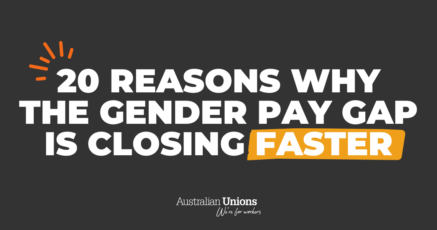Update: 1 February 2023
10 days paid Family and Domestic Violence Leave is now a workplace right for every employee in Australia – learn more about how the leave works.
This win comes off the back of a decade of campaigning by the union movement and activists. A decade which has seen us win change, workplace by workplace, agreement by agreement, then in Awards, and now, in the National Employment Standards.
On Thursday, the Federal Labor Government introduced a Bill into parliament which will enshrine paid Family and Domestic Violence Leave (FDV Leave) into the National Employment Standards. This new right was won because of more than over a decade of vigorous campaigning by the union movement.
Support is always available
-
Call 000 if you, a child, or another person is in immediate danger.
-
1800RESPECT: Call 1800 737 732 if you or someone you know is impacted by sexual assault, domestic or family violence.
-
No to Violence Men’s Referral Service: Call 1300 766 491 for anonymous and confidential telephone counselling, information and referrals for men.
-
Kids Helpline: Call 1800 55 1800 for 24/7 counselling for Australian children and young people.
-
Q Life: Call 1800 184 527 for anonymous and free LGBTQIA+ peer support and referral.
Earlier this year, the Australian Council of Trade Unions made submissions to the Fair Work Commission’s (FWC) review into the current inadequate model that provided workers with five days unpaid Family and Domestic Violence Leave. Instead, the Australian union movement was advocating for a variation that entitled employees to 10 days paid family and domestic violence leave.
During these hearings, experts from the health, legal and community sectors called for urgent policy changes on behalf of those experiencing family and domestic violence – an issue that has seen a 62 percent increase in people accessing domestic violence services since the beginning of the pandemic.
While family violence certainly touches the lives of many Australians, the evidence is that women are disproportionately impacted, and are also disproportionately over-represented in lower-paid, casual and insecure jobs.
Women fleeing domestic violence often suffer from emotional and financial distress, posing serious barriers to securing employment, permanent housing, health treatment and legal advice. The average cost of fleeing domestic violence is a whopping $18,000.
“Family and domestic violence is a national emergency in Australia with one in four women having experienced some form of violence since the age of 15 at the hands of an intimate partner. It cannot be understated just how critical winning paid FDV leave is – lives will be saved”, said ACTU President Michele O’Neil on Thursday.
A crucial step in combatting this crisis is ensuring that those experiencing family and domestic violence are financially secure enough to address these challenges. Introducing a scheme that provides 2.23 million award-dependent workers with 10 days paid FDV leave will enable those who are vulnerable to violence at home to access the vital resources they need to stay employed, housed and healthy.
What’s more, the cost to employers is very low, adding only 0.04 cents per hour worked. We know that employers already providing 10 days paid FDV leave – through union-won collective agreements and also modern Awards variations – are more likely to see greater retention of staff and higher levels of productivity when their employees are able to take paid leave to overcome serious challenges at home.
As we usher in these new rights, we also commemorate all the lives lost and people impacted in Australia by family and domestic violence.
“For over a decade, unions campaigned for 10 days paid family and domestic violence leave in the NES so that no worker would miss out. We were met with constant opposition by the former Coalition Government, but we never gave up. Today, while we celebrate the introduction of paid FDV leave into parliament, we also stop and remember all the lives lost too soon and the struggle that continues”, O’Neil said.







SHARE:
Union-backed win for paid Family and Domestic Violence Leave will save lives